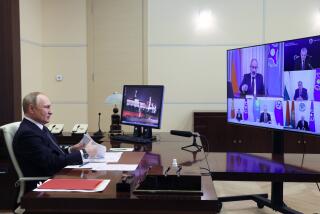Gorbachev’s Visit to Japan Planned for April
- Share via
TOKYO — Soviet Foreign Minister Eduard A. Shevardnadze told Japan on Thursday that President Mikhail S. Gorbachev will make his long-planned visit here in the “middle of April” next year but offered no assurance that the Soviet leader would settle a territorial dispute that continues to poison Soviet-Japan relations.
Shevardnadze delivered the message in an hourlong meeting with Prime Minister Toshiki Kaifu.
The visit--which after years of discussion the Soviets in 1989 scheduled for “sometime in 1991”--will be designed to bring about a “fundamental improvement” in Soviet-Japan relations, Shevardnadze told the prime minister. Gorbachev, in a message that Shevardnadze relayed to Kaifu, complained that bilateral ties lagged far behind changes sweeping the rest of the world.
Although four Japanese prime ministers have visited Moscow since the two nations restored diplomatic relations in 1956, no top Soviet leader has ever traveled to Japan. The two nations have never signed a peace treaty to formally end World War II hostilities.
Kaifu responded that he, too, hopes that Gorbachev’s visit will lead to an improvement in relations. But he warned the Soviet foreign minister that “the issue of returning the four northern islands is one that cannot be bypassed,” according to Kazuhiko Togo, director of the Foreign Ministry’s Soviet section.
The Soviets seized the islands off the east and northeast coasts of Japan’s northernmost island of Hokkaido after World War II.
Shevardnadze called the territorial dispute “the most difficult and complicated issue” between Moscow and Tokyo. Creating an overall “environment of trust and goodwill” must precede a solution that both sides can accept, Togo quoted him as telling Kaifu.
A solution, Shevardnadze added, must not injure the security interests of either country--an apparent reference to the location of the islands on the outer rim of the Sea of Okhotsk, the Soviets’ naval gateway to the Pacific.
Japanese diplomats said that Shevardnadze’s statements marked the first time that the Soviet Union has acknowledged the importance of settling the territorial dispute as a prerequisite to improving bilateral relations. Previously, Shevardnadze referred to the issue only as “a difficulty” blocking a peace treaty and closer ties.
Symbolizing attempts by both nations to broaden a relationship that has been frozen in continuing feuding over the issue, Foreign Minister Taro Nakayama and Shevardnadze signed four technical agreements as they completed nearly nine hours of talks over the last two days. One involved a promise of Japanese aid to Soviet victims of the 1986 Chernobyl nuclear power plant accident.
The Soviets’ top diplomat also proposed to meet Nakayama again this month at the United Nations in New York and before the end of the year in Moscow. He was scheduled to leave Tokyo today.
More to Read
Sign up for Essential California
The most important California stories and recommendations in your inbox every morning.
You may occasionally receive promotional content from the Los Angeles Times.











